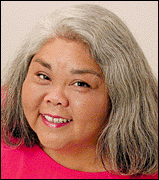


![]()
Under the Sun
If the boy next door
jumps off a cliff ..."THAT'S how it's done in Idaho." "We're the only state in the country that doesn't."
I hear these or similar sentiments often, the implication being that Hawaii is out of step, backwards or just plain clueless for not accepting practices that others employ, or for applying them while others don't.
I've also heard said that "Hawaii is unique;" that "we're not like other states." I've listened as the speaker tones the words with belittling sarcasm. I've heard it used as valid argument -- and as weak excuse.
Politicians are fond of holding up a mainland example when they crusade for something. Governor Lingle, in her quest to decentralize public schools, denounced the system, saying, "No other state, other than Hawaii, has a statewide school system. None."
This is true. It is also true that no other school system is financed primarily by general revenues instead of property taxes, a situation that often leads to inequity where poorer communities have lagging schools while more prosperous ones have superior institutions.
Hawaii's school system does stand in stark contrast to those elsewhere. No argument there. My objection to such broad pronouncements is they convey the idea that the solo status means something is amiss, that we're doing something wrong, without a clear assessment of the benefits, disadvantages and the fit of school operations to our goals, not to those in Louisiana or Texas.
East Honolulu Rep. Bud Stonebraker used the mainland argument with a different slant.
"I just don't think we have any business trying to aggressively pursue something that half the country has already shot down as being a bad idea," he said about a proposal for universal health care. In other words, if such plans didn't work in Ohio, why would they succeed in Hawaii?
Good question. If Stonebraker means we should learn from failures in other states, fine. If he means Hawaii's second-rate abilities would doom the plan, his mindset may need adjusting, for it only reinforces a self-defeating impression of inferiority.
Some people put down the view that Hawaii is unique. It could be because it is often used as a pretext, a way to rationalize shortcomings. It also could be because many don't want it to be. They'd prefer that Hawaii be cast more closely to the rest of America, kind of like a McDonald's nation where tastes aren't unexpected, where comfort is nestled in homogeneity.
It's hard to deny that Hawaii is different tangibly. No other states are made up of small land masses in the middle of the Pacific Ocean. Our human composition, cultural and ethnic links and customs aren't like those in other states. There are no value judgments being made, but there are distinctions.
I suppose hometown pride and a desire to preserve certain values provoke resistance to modeling ourselves like others, but there are times when this may be advantageous.
Alaska, after suffering numerous environmental violations, crafted a law to regulate discharges from cruise ships. That state had depended on the industry to do the right thing, but when that didn't work, legislators decided to insert some legal muscle. Hawaii has a toothless memorandum of understanding with cruise ship companies promising they will do no harm, but Alaska's experience should be a beacon of warning.
Unfortunately, bills before the Legislature, patterned after Alaska's, have been checked by two men. Sen. Cal Kawamoto and Rep. Joe Souki, using their powers as chairmen of their transportation committees, are refusing to allow the bills to be heard, effectively killing them.
We don't want to play copy cat with everything others do. Utah allows billboards to mar its landscapes and we sure don't want billboards. Hawaii is unique -- oops, there's that pesky notion again -- in that environmental concerns are intensely connected to our economy. If there is any situation in which Hawaii should emulate other states, prescribing environmental standards for cruise ships is one of them.
Cynthia Oi has been on the staff of the Star-Bulletin for 25 years.
She can be reached at: coi@starbulletin.com.